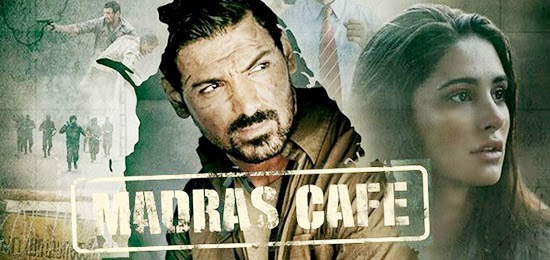Let me begin this film review with a question – has anyone ever seen Milan Luthria, Anil Sharma and Kanti Shah in the same room at the same time?
Sample these:
Kaam to mai gande karta hu, lekin saaf sutra rehne ki bahut gandi aadat hai hahaha.
Meter kitna bhi tezz bhaage, taxi se aage nahi bhaagta.
Doodh me jo nimbu nichode, Paneer uska.
You'd think that a Hindi movie with a plot that chronicles a 90’s Mumbai don starring Akshay Kumar would be a campy fun watch, filled with entertaining dialog, humor and action. Those would be fair expectations right?
Wrong.
Featuring an utterly awful screenplay and more overbearing pulpy dialogues than you can shake a fist at, the unfortunately named and spelled Once Upon Ay Time In Mumbai Dobaara is a plodding and tiresome experience.
A terrible thing that happened was that we made the original Once Upon a Time in Mumbai a huge hit, which led to the beliefs that -
a) Milan Luthria is a great filmmaker,
b) ‘Masala movie’ lovers will pay anything to see a film in which a big star smokes slow mo cigarettes and hurls dialogues,
c) Bollywood will cannibalize a brand name as long as the franchise makes a ton of money. I don't know who it was that said ‘Alright listen this Akshay Kumar and Dawood style genres ooze money from every pore so let’s mash things together’, but someone at the meeting should have said ‘Honey no, are we still making Dawood a hero? Might as well turn Kasab into a comedian, like RGV did’. Unfortunately this rebuttal never happened because if it had then Once Upon Ay Time In Mumbai Dobaara would have ended up in a trash can rather than in theaters that cost Rs 500 per stub.
The film takes a bunch of familiar modules, coats them with some fresh paint and hopes paying audiences won’t notice how old and tired the clichés are. A Middle Eastern gangster, who has come to Mumbai to rule the city, and his right-hand stooge fall for the same girl – an actress in the Hindi film industry. Ah yes, the love triangle. Is there a more overused and abused genre in Bollywood? Our hero villain Akki aka Shoaib Khan in OUATIMD is a lumbering mess and the film has no heart, humor, wit or even a semblance of fun. The film’s biggest joke is a half hour misunderstanding between ‘intermediate’ and ‘intercourse’, which makes it seem like a rejected episode of Three’s Company. The comedy, however, is salvaged because the censors bleep out ‘inter’ in ‘intercourse’, but not the word ‘sex’.
Director Luthria populates his film with stock gunda characters, lethargic plotting and 80s-style nonsensical contrivances, padded with a barrage of punchlines; none of which are particularly amusing or exciting. In one scene Shoaib fondles a lady and while admiring her red bra strap lasciviously mumbles, “Laal batti se purana rishta hai, hamesha peeche rehti hai, lekin aaj aage hogi.” Punch lines like this don’t make a lick of an impact coming from Akshay Kumar, who after a string of lukewarm box office numbers from Joker, Special 26, Khiladi 786, decided the only way to keep paying his rent was to leech off big franchises. Whoever thought it was a good idea to let Kumar, who sounds like a drunk Yogi Bear, deliver 300+ punch lines in one film should be made to listen to the actor sing “Ave Maria” and recite a whole phone book.
The non-Akki portion of the film consists of a meandering subplot featuring Imran Khan and Sonakshi Sinha’s blossoming romance, just enough to fill three very unremarkable hours. Sadly, Sinha lays waste to the goodwill she garnered with Lootera and Imran transcends new levels of ineptitude with his terrible performance. To be fair, the poor guy is saddled with a lousy role – in one scene he robs a guy and then saves his life because he cannot do two wrongs in one day; the logic of which is explained with “Mujhe samajhne ke liye dimaag nahi, dil lagta hai” – a reasoning that probably applies to understanding this film as well.
Although Once Upon Ay Time In Mumbai Dobaara boasts decent production design and some rather fine cinematography from Ayananka Bose the main problem here is pacing. The film has incredibly long dry stretches, including a ludicrous conflict of 'loyalty vs love' that waddles onto the screen every now and then. Luthria just plunges everything in front of the camera with little attention to pacing or common sense, and even if you ignore the slack pace or the unintelligent characters there's no getting around the fact that there's nothing remotely new or exciting about the film.
It's not that making a masala or a ‘throwback’ film is a bad idea, it's that Once Upon Ay Time In Mumbai Dobaara doesn’t capture what makes this genre a fun ride in the first place. The ‘throwback’ details (such as the wardrobe and the music) exist only to annoy old-school Bollywood fans, because Luthria’s film clumsily flings the basics together and then rambles around aimlessly. No amount of Mumbaiyya gangsta razzle dazzle can mask the fact that OUATIMD is a wearisome and uninteresting. The film’s only impactful point is that Cigarette smoking is injurious to health, as per the helpful pop up text which appears every time someone reaches out for a drag, which is 90 percent of the film’s running time.
(First published in Firstpost)






















